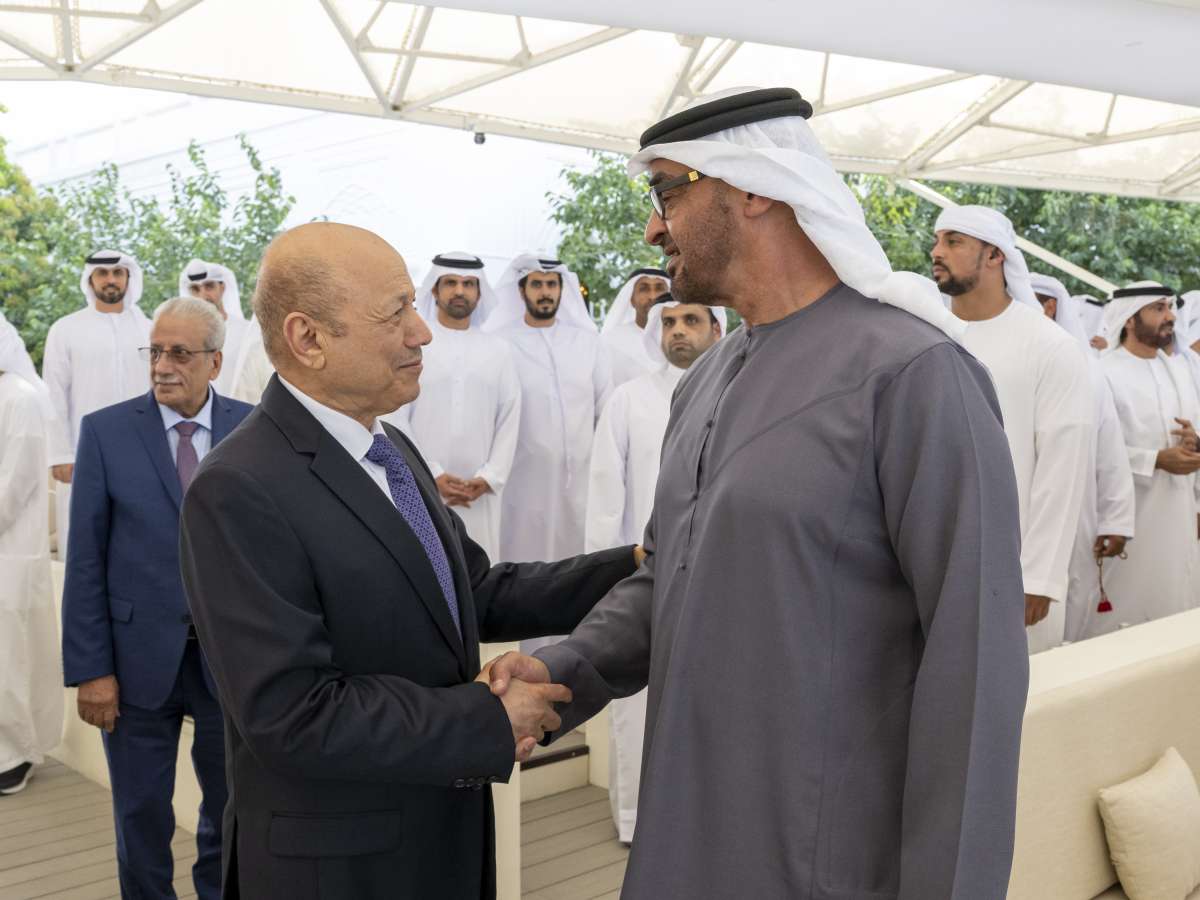UAE President and visiting Chairman of Yemen’s Presidential Leadership Council discussed bilateral relations, developments in Yemen, and a number of regional issues….reports Asian Lite News
President His Highness Sheikh Mohamed bin Zayed Al Nahyan yesterday received Rashad Al Alimi, Chairman of Yemen’s Presidential Leadership Council.
The two sides discussed bilateral relations, developments in Yemen, and a number of issues of common interest.
During the meeting, held at Qasr Al Bahr in Abu Dhabi, His Highness Sheikh Mohamed welcomed the PLC Chairman and congratulated him on his country’s National Day, which was observed on 22nd May, wishing Yemen and its people prosperity and progress.
His Highness Sheikh Mohamed affirmed that the UAE stands in support of Yemen and its people in their pursuit of peace, stability, and development.
Al Alimi expressed his thanks to Sheikh Mohamed for the kind reception and extended his appreciation for the support provided by the UAE to the Yemeni people, wishing the UAE and its people further progress and prosperity.
The meeting was attended by His Highness Sheikh Mansour bin Zayed Al Nahyan, Vice President, Deputy Prime Minister and Minister of the Presidential Court; H.H. Sheikh Nahyan bin Zayed Al Nahyan, Chairman of the Board of Trustees of the Zayed Charitable and Humanitarian Foundation; H.H. Lt. General Sheikh Saif bin Zayed Al Nahyan, Deputy Prime Minister and Minister of the Interior; H.H. Sheikh Abdullah bin Zayed Al Nahyan, Minister of Foreign Affairs, and the accompanying delegation of the Chairman of Yemen’s Presidential Leadership Council.
Earlier, the leaders of the Arab countries stressed the importance of strengthening joint Arab action based on common foundations, values, interests, and one destiny. This came in the “Jeddah Declaration” at the conclusion of 32nd Regular Session of the Arab League Council at the Summit Level (Jeddah Summit).
The Declaration expressed its support for all efforts that could guarantee security and stability in the Republic of Yemen and fulfill the aspirations of the Yemeni people.
The Yemeni leader had recently issued a fresh call for national unity ahead of the country’s National Day, amid calls to demand the southern region’s secession from the republic.
In an eve-of-celebration speech delivered from his temporary office in the Saudi capital of Riyadh, al-Alimi stressed the importance of the 1990 unification of North and South Yemen after decades of struggle.
While acknowledging the mistakes that came along with the unification, he voiced the PLC’s commitment to pushing forward political reforms.
He also warned of the Houthi militia’s threat, accusing them of falsely advocating for “unity or death” while planning to invade the country’s southern regions.
The Yemeni leader urged all political factions to unite around the council to achieve common goals, put an end to the Houthi coup, restore state institutions, and alleviate the years-long suffering.
Despite al-Alimi’s appeal for unity, calls for secession are growing louder, particularly in Aden and other major southern cities that are now controlled by the Southern Transitional Council (STC).
On Sunday, chief of the STC Aidarous Zubaidi, who also serves as the deputy to al-Alimi in the PLC, kickstarted the sixth session of the National Assembly that convened in Mukalla, the capital of Hadramout province.
Zubaidi made it clear in his speech in Mukalla that the STC, which is headquartered in Aden, is determined to pursue its political goals, one of which is seeking “outright independence”.
Yemen, an impoverished Arab country plagued by violence and political turmoil, is teetering on the brink of further fragmentation as the southern region’s grievances threaten the country’s unity, according to local observers.
As part of efforts to address southern grievances, al-Alimi announced last week the reinstatement of more than 52,000 civil, security, and military employees who were forcibly dismissed from their jobs in the country’s southern provinces after the 1994 civil war.
In 1994, a civil war erupted in Yemen, four years after the unification of North and South Yemen to form the Republic of Yemen.
The conflict was caused by a secessionist movement by southern Yemen that sought to break away from the northern part of the country.
One of the consequences of the war was the mass dismissal of thousands of employees, who had previously held jobs in various sectors of the southern region, including government, security, and the military.
The abrupt dismissals were seen as a punitive measure against those who had supported the secessionist movement.
The secessionist sentiment in the southern part of Yemen continued to grow, fuelled by the feeling of economic and political marginalization and discrimination.
The Yemeni government has repeatedly denied allegations of discrimination against the southern provinces.

